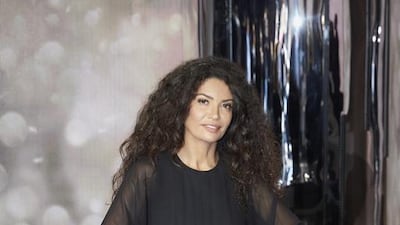The regional Project Runway spin-off was bound to happen, considering how much international acclaim is increasingly being afforded designers from the Arab world.
From world-renowned couturier Elie Saab – always a major supporter and mentor of Arab talent, and a judge on the show – to household names such as Zouhair Murad, Reem Acra, Georges Chakra and Rami Al Ali, there is no shortage of fashion-industry talent in the Middle East.
But will the launch of the Arabic version of the popular reality-TV show mark a watershed moment for the region’s fashion arena? Is it the best vehicle for showcasing young talent in the industry? Saab seems to think so, although fellow judge Afef Jnifen – the Tunisian-Italian actress and fashion icon – says it is not necessarily a shortcut to success.
“In the Arab world, for sure many have a talent when it comes to fashion, but the designers are still in need of a lot of work,” she says. “They have so much to work on to be equal to compete with designers on an international level.
“They lack a finesse – there’s a finishing touch to a design that they need to learn to care about. They place no store in the importance of the tiny details that make a dress.”
More importantly, she says, many regional designers have yet to understand the concept of “less is more”.
“With the participants on the show, like with most designers of the region, fashion to them is to have more and more and more of everything,” says Jnifen. “They like to cover every model with 1,000 kilograms of make-up and 100kg of hairspray – you have no idea.”
For the judges, she says, the challenge was to teach the participants that beauty can be found in simplicity, that class and elegance means being understated, and that a model’s natural beauty is the best way to showcase the intricacies of their designs.
“Presentation is everything,” adds Jnifen, who says European fashion shows are about the designs, while in the Arab world they are more often about the make-up, hair, ornaments and over-the-top embellishments.
“Addressing this on TV,” she says, “will go a long way towards teaching potential designers and helping strengthen fashion from the Arab world.”
Saab says that his dream is to have Middle East cities held to the same standard as Milan, Paris and New York – the fashion capitals of the world.
"I have been working on this for 20 years," he says. "It requires a lot of cooperation and effort, and a show such as Project Runway will go a long way towards making this dream happen."
“Elie Saab is known for many things,” says MBC Group’s spokesman, Mazen Hayek. “He has an indescribable love for the Arab world and especially for Beirut, which he considers his muse. He doesn’t stop thinking and creating, and noticing every single detail around him, even to the angle of flower stalks in a vase. He has an obsession with details; he’s a volcano of innovation and creativity and colour, but presented in a mould of modesty and humbleness and simplicity.”
It is this reputation that made him the perfect choice to lead, guide and mentor the first batch of hopeful fashion aspirants, many of whom have raw talent but zero experience.
“We tried to remind participants that even if they were on the show, they haven’t even started yet,” says Saab. “In this industry, there’s no place for vanity. In the end, they are selling a product. It is this product that will gain respect for you as a designer. Your personality is your customer’s last worry so keep it simple.”
There’s no doubt it’s a hard profession to break into and find success in, but it’s about time someone showed the way.
By having someone of Saab's calibre involved as mentor and guide, renowned for a work ethic and raw talent that has placed him on a par with the leading designers of the world, there is a very good chance that Project Runway's Middle Eastern debut will prove to be the turning point for Arab fashion designers and their hopes of reaching international recognition.
artslife@thenational.ae

